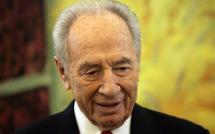
"He fainted for at most a dozen seconds before regaining consciousness and at first had refused to go to the hospital," his spokeswoman Ayelet Frisch told reporters.
"A doctor said he had experienced a drop in blood pressure. The first cardiology exams did not indicate any heart attack or stroke," she said, adding that Peres was likely to leave the hospital on Sunday.
Peres's personal physician, Rafi Valdan, told the Ynet news website that the octogenarian was feeling fine after the incident.
"He feels well and the incident is over," Valdan said.
"It was simply very hot and he stood up for a long time and felt dizzy. He fainted for a few seconds," he said. "At this time he feels fine, he's smiling and he's on the phone with the whole world."
Peres, who keeps to a busy public schedule despite his advanced age, is Israel's veteran statesman who was awarded the Nobel Peace Prize in 1994, alongside then prime minister Yitzhak Rabin and Palestinian leader Yasser Arafat, for his role in negotiating the 1993 Oslo accords.
He was elected by parliament to the largely ceremonial post of Israeli president in 2007, crowning a career spanning five decades during which he has held just about every major national office, including twice as prime minister.
Born in Poland in 1923, he emigrated to Palestine when he was 11. He joined the Zionist struggle in the 1940s and met Israel's founding father, David Ben Gurion, while hitchhiking.
At 29, he became director general of the nascent defence ministry and is considered the founding father of Israel's undeclared nuclear programme.
Peres, who once hawkishly rejected any compromise with hostile Arab states, says he was converted after 1977, when Egyptian president Anwar Sadat made a historic visit to Jerusalem, leading to the first Arab-Israeli peace treaty.
In 2005 he left his lifelong Labour party to join the new centrist Kadima headed by Ariel Sharon, an alliance that ensured Israel withdrew troops and settlers from the Gaza Strip after 38 years of occupation.
Although widely admired abroad, Peres is known for being an electoral liability as much as an asset and has never been such a hit at home.
The one-time foreign, defence and finance minister was defeated in Israeli general elections in 1977, 1981, 1984, 1988 and 1996. He never led Labour to victory.
He was prime minister between 1984 and 1986 and again from 1995-1996.
The extent of international admiration for Peres was seen at his lavish 80th birthday party, patronised by ex-presidents Bill Clinton and Mikhail Gorbachev. Film director Woody Allen sent greetings "from a bad Jew to a very great Jew."
---------------------------------------------------------------------------------------------------------------------------------
"A doctor said he had experienced a drop in blood pressure. The first cardiology exams did not indicate any heart attack or stroke," she said, adding that Peres was likely to leave the hospital on Sunday.
Peres's personal physician, Rafi Valdan, told the Ynet news website that the octogenarian was feeling fine after the incident.
"He feels well and the incident is over," Valdan said.
"It was simply very hot and he stood up for a long time and felt dizzy. He fainted for a few seconds," he said. "At this time he feels fine, he's smiling and he's on the phone with the whole world."
Peres, who keeps to a busy public schedule despite his advanced age, is Israel's veteran statesman who was awarded the Nobel Peace Prize in 1994, alongside then prime minister Yitzhak Rabin and Palestinian leader Yasser Arafat, for his role in negotiating the 1993 Oslo accords.
He was elected by parliament to the largely ceremonial post of Israeli president in 2007, crowning a career spanning five decades during which he has held just about every major national office, including twice as prime minister.
Born in Poland in 1923, he emigrated to Palestine when he was 11. He joined the Zionist struggle in the 1940s and met Israel's founding father, David Ben Gurion, while hitchhiking.
At 29, he became director general of the nascent defence ministry and is considered the founding father of Israel's undeclared nuclear programme.
Peres, who once hawkishly rejected any compromise with hostile Arab states, says he was converted after 1977, when Egyptian president Anwar Sadat made a historic visit to Jerusalem, leading to the first Arab-Israeli peace treaty.
In 2005 he left his lifelong Labour party to join the new centrist Kadima headed by Ariel Sharon, an alliance that ensured Israel withdrew troops and settlers from the Gaza Strip after 38 years of occupation.
Although widely admired abroad, Peres is known for being an electoral liability as much as an asset and has never been such a hit at home.
The one-time foreign, defence and finance minister was defeated in Israeli general elections in 1977, 1981, 1984, 1988 and 1996. He never led Labour to victory.
He was prime minister between 1984 and 1986 and again from 1995-1996.
The extent of international admiration for Peres was seen at his lavish 80th birthday party, patronised by ex-presidents Bill Clinton and Mikhail Gorbachev. Film director Woody Allen sent greetings "from a bad Jew to a very great Jew."
---------------------------------------------------------------------------------------------------------------------------------









 Home
Home Politics
Politics









